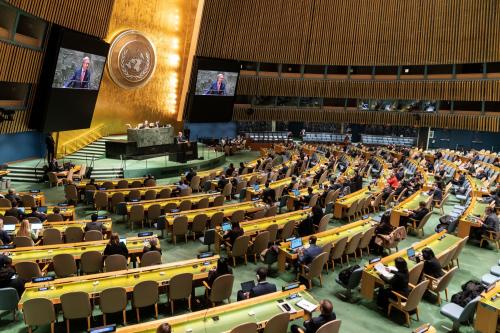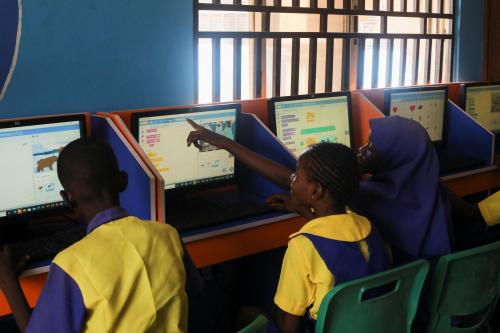Below is a Viewpoint from Chapter 3 of the Foresight Africa 2020 report, which explores six overarching themes that provide opportunities for Africa to overcome its obstacles and spur inclusive growth. Read the full chapter on leveraging demographic trends for economic transformation.
The world is well into the Fourth Industrial Revolution, and yet education systems have not kept pace. Young people are often not learning the skills they need to succeed in the 21st century and interact with their changing world, such as digital literacy, problem solving, and critical thinking. Despite widespread recognition of the importance of these skills for the future in education policies, very few education systems have adapted to this reality. On the African continent, where 60 percent of the population is under age 25, the teaching of 21st century skills will be necessary for Africa to transform itself into a continent of growth and opportunity. If young people do not learn how to use and create with technology, they are sure to fall further behind.
How can Africa harness the power of technology when only 24 percent of Africans have access to the internet? Despite gains in internet access over the last several years, the region lags behind the rest of world in internet usage. A Pew survey of six African countries finds that internet usage is high among youth, which is good news for schools as it will help them teach 21st century skills; however, the study also finds that internet users tend to be male and have higher incomes and more education, meaning that more needs to be done to ensure all young people, no matter their gender or socioeconomic status, develop skills that enable their future success.
Education systems need to equip their students with basic tech proficiency and, going further, enable students to create with technology.
Education systems need to equip their students with basic tech proficiency and, going further, enable students to create with technology. The Center for Universal Education (CUE) at Brookings is interested in how education systems can foster the development of skills for the future through computer science (CS). (Many similar and related terms exist such as computing, informatics, computational thinking, and coding. We’ve used computer science here, but the specific term is less important than whether students are learning and understanding how computers work.) CS education helps students understand how computers work, use algorithms to create computer programs and apps, and work with their peers to solve complex issues. Given that computers are all around us and technological advances are disrupting every industry, knowing how to use them will be beneficial to anyone, whether or not they wish to become a computer scientist.
Already, there are many examples of CS education taking place in Africa. For example, the Ghana Code Club is a weekly after-school coding club that has trained more than 1,700 students and 300 teachers across 100 centers, and Teencoders, based in Nigeria, has reached over 5,000 students through after-school and weekend coding classes. While these nonformal education programs give learners critical exposure to the discipline, expanding CS education into formal primary and secondary schooling can ensure that many more young people learn computer science concepts.
One potentially promising way to overcome resource constraints is to teach without a computer.
Certainly, many constraints exist, including funding for equipment, lack of trained teachers, and lack of time during the school day to teach CS given other curricular priorities. One potentially promising way to overcome resource constraints is to teach without a computer. The platform CS Unplugged uses worksheets, magic tricks, art projects, and games to teach students computer science concepts offline. In one lesson, students learn about the binary system by creating a beaded necklace with their initials in binary numbers. While the teacher will need internet access to obtain the materials, these activities work well in cases where there are few computers in the classroom or intermittent internet access. A forthcoming CUE study looks further at the barriers to expanding CS education with the goal of uncovering models around the world that have succeeded despite various constraints.
As the examples of Ghana Code Club, Teencoders, and others show, many already recognize the need for young Africans to learn computer science. However, more needs to be done to ensure that all students have the opportunity to learn these concepts and to develop skills of the future.








Commentary
Computer science can help Africans develop skills of the future
January 27, 2020